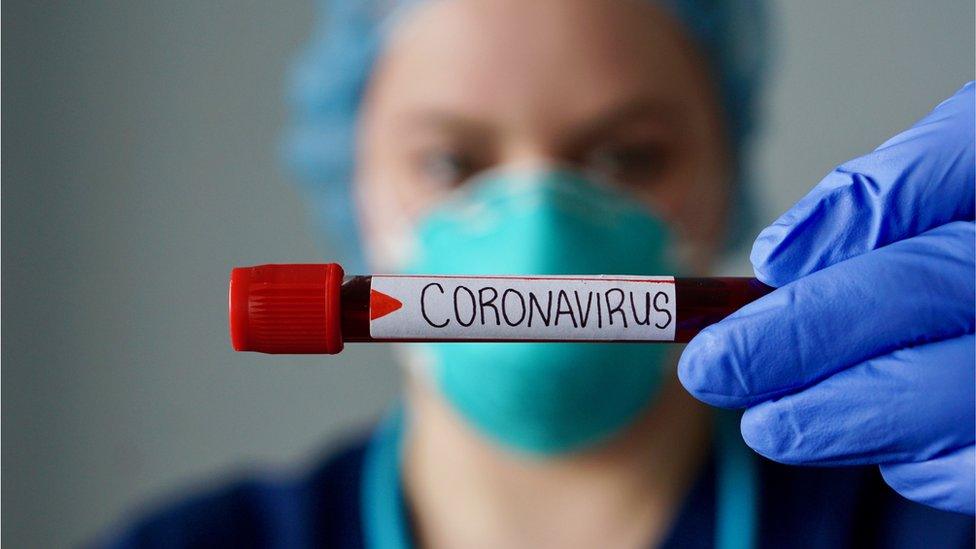Coronavirus: Health watchdog board resigns over row with officials
- Published
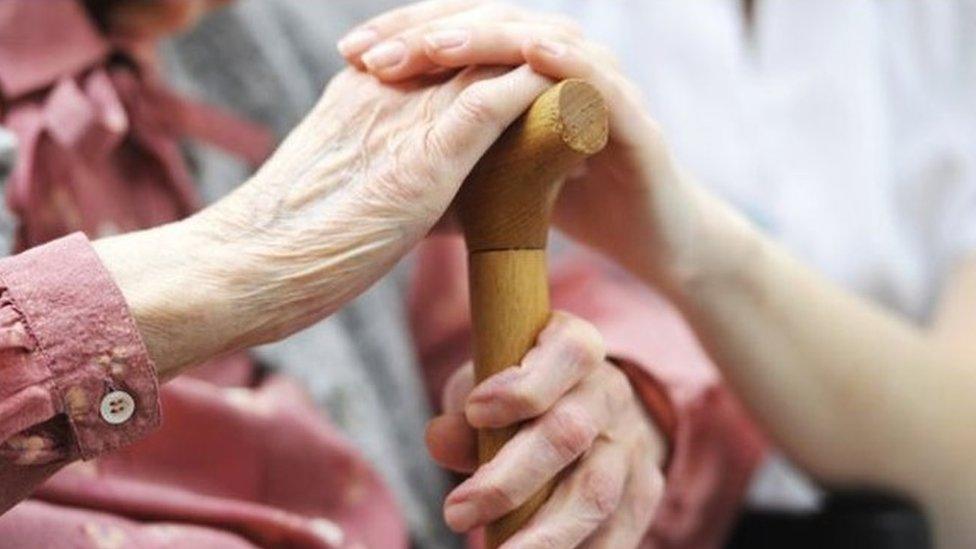
The entire board of the watchdog that oversees NI's care homes has resigned.
BBC News NI has learned that it comes after a row over the handling of the coronavirus pandemic.
The nine former board members of the Regulation and Quality Improvement Authority (RQIA) claim they were not consulted on a number of decisions taken by the Department of Health.
These included ending inspections of care homes and re-deploying senior RQIA staff to other health bodies.
Health Minister Robin Swann said it was "a matter of regret" that a number of former board members decided to resign "at this most difficult time".
The RQIA is responsible for monitoring the quality of health and social care services in Northern Ireland, including carrying out care home inspections.
Its board is responsible for holding the regulator's management to account.
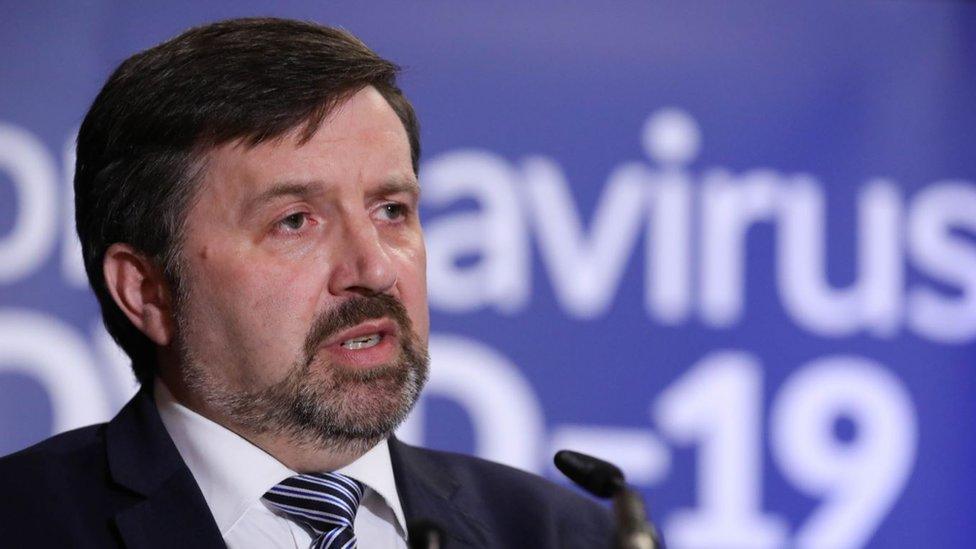
Robin Swann said board members did not contact him
In a statement to the BBC, the former board members said a number of decisions were made without any input from them which they "couldn't stand over".
These included the move to reduce the frequency of inspections in care homes, the redeploying of RQIA staff including chief executive Olive Macleod to other agencies and the decision to make RQIA inspectors work in other roles in care homes.
They said: "In the board's view these decisions diluted the RQIA's independence and critical function as a regulator to maintain the protection of vulnerable adults in residential and nursing homes during the Covid-19 crisis."
The Department of Health says the decision in March to reduce the number of inspections of care homes was taken to reduce the risk of infection.
On Monday, the department lifted the restrictions on inspections saying community transmission of Covid-19 was significantly reduced.
One board member told BBC News NI they felt "angry and let down" about how the board had been treated.
The latest official figures show that more than 50% of deaths with coronavirus took place among care home residents.
A judicial review of the decision to suspend RQIA inspections is due to be heard on Tuesday. It's being taken by a family whose loved one was in a care home.
'Critical time'
Responding to Monday's resignations, a Department of Health spokesperson said: "At no time did the department seek to undermine the board of RQIA and remained in regular communication with the interim chair.
"The action taken by the department was to ensure that the expertise and resources of RQIA were used to support the wider HSC response to the Covid-19 pandemic and in particular to provide support to the social care sector on which so many vulnerable people rely."
They added: "The offer of an interim chair arrangement was made with the aim of supporting the board at what was a very challenging time for everyone across health and social care."
Sinn Féin's Colm Gildernew, chair of Stormont's health committee, said he was deeply concerned by the board's resignation.
"I am calling on the minister of health to come forward and explain the circumstances which led to this unprecedented action by the health and social care regulator, in the middle of a public health pandemic," he said.
"It is essential that the minister of health urgently explains to all the services and service users who rely on the RQIA to function, how the role of the regulator will continue to provide vital services to support and inspect health and social care services."
Alliance health spokesperson Paula Bradshaw described the development as "extremely concerning".
She said there had been "significant concerns about the communication coming from the DH" for some time.
'Gathering storm'
QUB Professor Phil Scraton called for a thorough independent inquiry into the matter.
He told BBC's Evening Extra programme the mass resignation was "unprecedented" and the result of a "gathering storm".
"We have known for a long time there was poor preparation for Covid," he said.
BBC News NI has also seen emails from the then chair of the RQIA board, Mary McColgan, raising concerns about how the regulator was carrying out directions given by the Department of Health.
In an email sent on May 4 to RQIA's interim chief executive, Dermot Parsons, Ms McColgan wrote: "Board members shared their concerns about RQIA's decisions in response to department directives and communication to providers and users of services in the residential and nursing home sectors."
She added: "RQIA communication and conveying key messages to the public is paramount at this critical time."
However, Ms McColgan also said a further proposal to send RQIA staff into care homes to work in support roles "contradicts" the original decision to reduce inspections.
Later that day, the RQIA interim chief executive, Dermot Parsons, wrote to Chief Medical Officer Dr Michael McBride stating he felt his position was untenable.
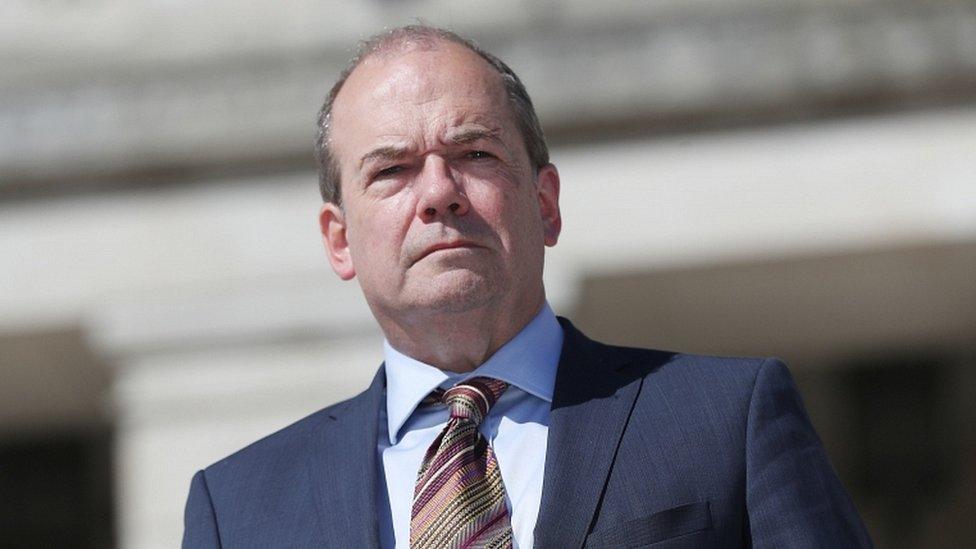
Dr McBride is Northern Ireland's chief medical officer
Mr Parsons told Dr McBride he felt the RQIA board "does not have confidence in my performance in this role" and he was unsure who he should discuss his "resignation" with.
He concluded the email by stating: "My main concern is that the distraction caused by this apparent conflict between RQIA Board and the executive team, mainly in the person of me, is taking away from time that should be spent working on partial solutions to the challenges posed by Covid-19 and, ultimately, contributing to saving lives of vulnerable people who live in care homes."
Dr McBride responded to Mr Parsons assuring him he had his "full support and confidence at this unprecedented time."
Ms McColgan was later asked by the Department of Health to step aside as interim chair but remain on the board in a non-executive role.
According to board members, this move triggered the mass resignation as they "had full confidence" in Ms McColgan.
'A lack of confidence'
On Thursday, Health Minister Robin Swann announced the appointment of a new chair of the RQIA, Christine Collins.
In his statement, he said that there had been a "number of resignations" from the RQIA board.
He did not reveal the reasons for the resignations, but said: "I believe the reasons cited for the resignations could have been addressed to the satisfaction of all concerned and I would place on record my thanks for their service."
Commenting on the decision of RQIA board members to resign, Mr Swann said: "These board positions are by ministerial appointment, yet it is disappointing that none of those resigning made any contact with me beforehand about any concerns.
"I fully appreciate that this has been an extremely challenging period for everyone across the health and social care system."
RQIA said the changes to the board membership would have no impact on its day to day work.
- Published10 June 2020
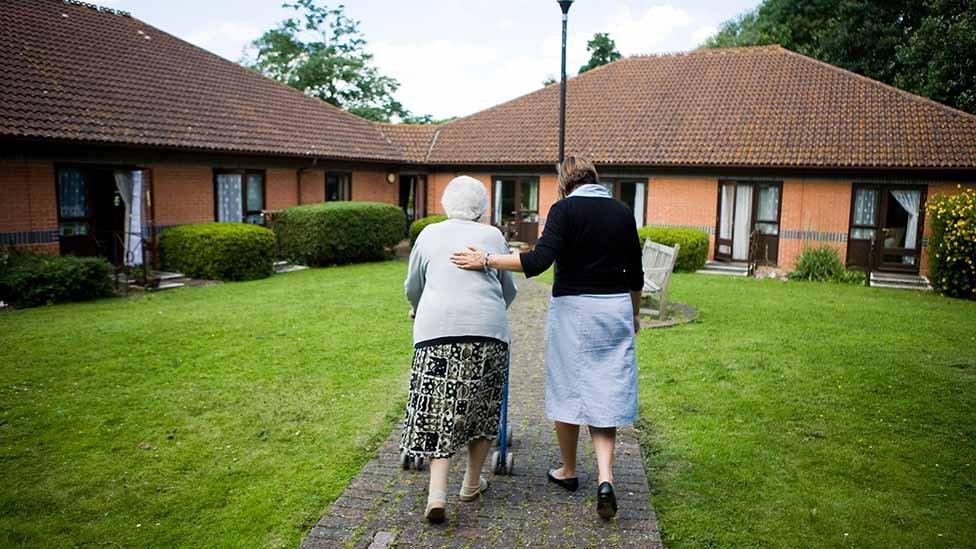
- Published29 May 2020
